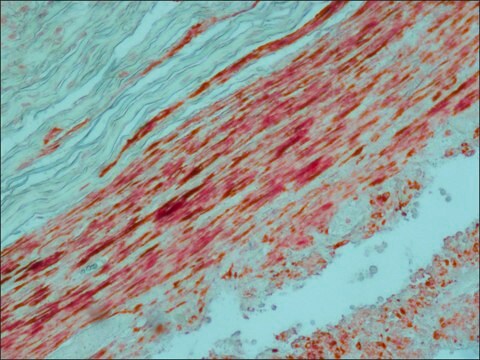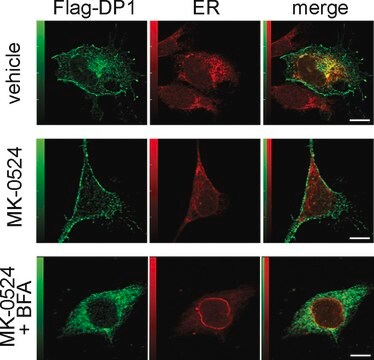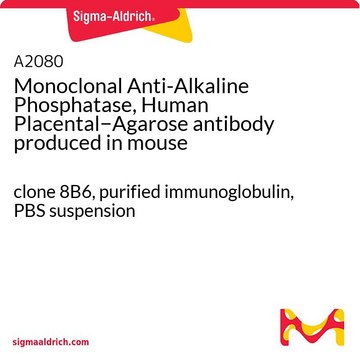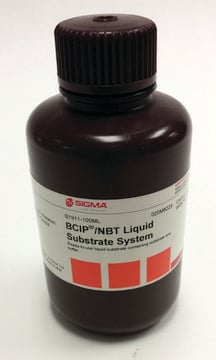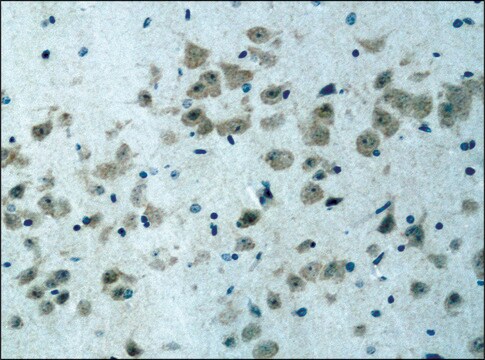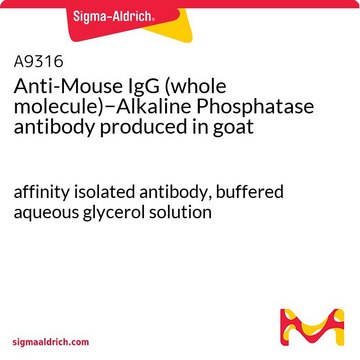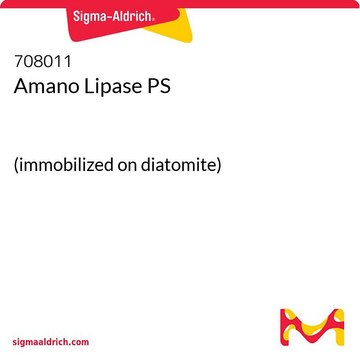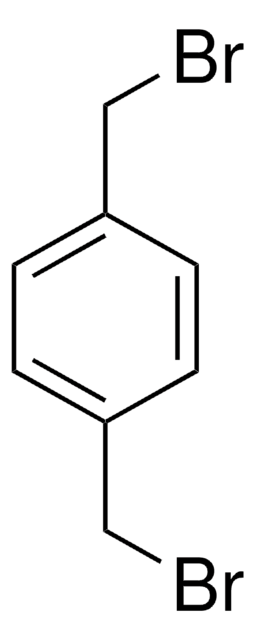推荐产品
生物源
mouse
品質等級
共軛
unconjugated
抗體表格
ascites fluid
抗體產品種類
primary antibodies
無性繁殖
8B6, monoclonal
包含
15 mM sodium azide
物種活性
human
技術
immunocytochemistry: suitable
immunohistochemistry (formalin-fixed, paraffin-embedded sections): 1:4,000 using human placenta
immunohistochemistry (frozen sections): suitable
indirect ELISA: suitable using whole cells
radioimmunoassay: suitable using radio-immunolocalization of xenografts of human cell lines expressing PLAP in nude mice2
western blot: suitable
同型
IgG2a
UniProt登錄號
運輸包裝
dry ice
儲存溫度
−20°C
目標翻譯後修改
unmodified
基因資訊
human ... ALPP(250)
正在寻找类似产品? 访问 产品对比指南
一般說明
In SDS gels, the product reacts with both Regan and Nagao isozymes of human placental alkaline phosphatase (hPLAP, 130 kDa, 67/130 kDa). By RIA, the antibody binds to hPLAP with an affinity constant of 5 × 109 LM-1. It does not react with PLAP-like enzymes.
Monoclonal Anti-Human Placental Alkaline Phosphatase (mouse IgG2a isotype) is derived from the 8B6 hybridoma produced by the fusion of mouse myeloma cells and splenocytes from immunized BALB/c mice. Placental alkaline phosphatase (PLAP) or ALPP is a phosphomonoesterase. It is expressed in the placenta and endometrium. The PLAP gene is localized on human chromosome 2q37.1. Small amounts of hPLAP are found in the endocervix, fallopian tubes and lung. Very small amounts of heat-stable AP resembling hPLAP (hPLAPlike AP) are expressed in the testis, thymus and in rare colon epithelial cells.
免疫原
Human epidermoid carcinoma cell line expressing placental alkaline phosphatase.
應用
Anti-Alkaline phosphatase human placental antibody coupled to agarose was packed in a column and used to purify alkaline-phosphatase conjugated FGF receptor out of conditioned media from COS-7 cells. Column was washed with 1M NaCl.
Cultured pancreatic islet cells were fixed with cold 4% paraformaldhyde at room temperature for 10 minutes and incubated with mouse monoclonal anti-Alkaline Phosphatase, Human Placental antibody at 1:500. Mouse monoclonal anti-Alkaline Phosphatase, Human Placental antibody was used to detect a unique molecular probe that consisted of the FGFR extracellular domain expressed as a chimera with human PLAP.
Monoclonal Anti-Alkaline Phosphatase, Human Placental antibody produced in mouse has been used in:
- enzyme-linked immunosorbent assay (ELISA)
- immunocytochemistry
- radio-immunolocalization
- western blot
- immunofluorescence
- immunohistochemistry
生化/生理作用
Placental alkaline phosphatase (PLAP) or ALPP is a hydrolase, which is involved in the hydrolysis of phosphomonoesters. It has been shown to be a biomarker for ovarian cancer. The protein is expressed in carcinomas such as ovarian adenocarcinoma, dysgerminoma, serous cystadenocarcinoma and undifferentiated carcinoma. Although hPLAP has been analyzed as a potential tumor marker, it has not been widely used in the routine clinical laboratory because of its low overall specificity due to heat-inactivation, cross-reactivity with intestinal AP and L-phenylalanine sensitivity. The use of monoclonal antibodies as reagents has greatly improved the sensitivity, reproducibility and accuracy of the tests used to distinguish placental isozymes from their tumor cell counterparts. Thus, monoclonal anti-alkaline phosphatase may be useful as diagnostic tools for tumor detection.
免責聲明
Unless otherwise stated in our catalog or other company documentation accompanying the product(s), our products are intended for research use only and are not to be used for any other purpose, which includes but is not limited to, unauthorized commercial uses, in vitro diagnostic uses, ex vivo or in vivo therapeutic uses or any type of consumption or application to humans or animals.
未找到合适的产品?
试试我们的产品选型工具.
儲存類別代碼
10 - Combustible liquids
水污染物質分類(WGK)
WGK 3
閃點(°F)
Not applicable
閃點(°C)
Not applicable
Isolation and purification of human placental plasma membranes from normal and pre-eclamptic pregnancies. A comparative study
Jimenez V, et al.
Placenta, 25(5), 422-437 (2004)
Cloverleaf skull anomaly and de novo trisomy 4p
de Brasi D, et al.
Journal of medical Genetics, 36(5), 422-424 (1999)
A human monoclonal antibody specific to placental alkaline phosphatase, a marker of ovarian cancer
Ravenni N, et al.
MAbs, 6(1), 86-94 (2019)
Refined structures of placental alkaline phosphatase show a consistent pattern of interactions at the peripheral site
Stec B, et al.
Acta Crystallographica Section F, Structural Biology and Crystallization Communications, 66(Pt), 8-8 (2010)
Isolation of basal membrane proteins from BeWo cells and their expression in placentas from fetal growth-restricted pregnancies
Oh SY, et al.
Placenta, 39, 24-32 (2016)
我们的科学家团队拥有各种研究领域经验,包括生命科学、材料科学、化学合成、色谱、分析及许多其他领域.
联系技术服务部门